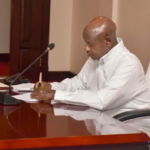The Constitutional Court has nullified Section 25 of the Computer Misuse Act which relates to using electronic devices to willfully disturb the peace of another.
The Section constituted a charge of offensive communication that has been carrying a maximum penalty of 5 years upon conviction.
In a unanimous decision of 5 justices, it has been agreed that Section 25 of the Computer Misuse Act be scrapped for not only being vague or overly broad to define the actual offense committed but also curtails the inherent freedoms of speech and expression that are guaranteed in the Constitution.
“I find that the impugned Section is unjustifiable as it curtails the freedom of speech in a free and democratic society. Secondly, Section 25 of the Computer Misuse Act No. 2 of 2011 does not specify what conduct constitutes offensive communication. To that extent it does not afford sufficient guidance for legal debate. Thirdly it is vague, overly 30 broad and ambiguous. Therefore, I find that the impugned section is inconsistent with and/or in contravention of Article 29 (1) of the Constitution, Article 19(2) of the International Covenant on Civil and Political Rights and Article 9(2) of the African Charter on Human and Peoples’ Rights,” the Court ruling reads.
The panel led by the Deputy Chief Justice, Richard Buteera, has ruled that it would be unjustified to maintain this Section of the Act in a free and democratic society when Uganda convened international treaties on freedoms and people’s rights.
The Court has therefore declared Section 25 as ambiguous and irrelevant and proceeded to award costs to the two petitioners including; human rights activists Andrew Karamagi and Robert Shaka.
Ruling:








